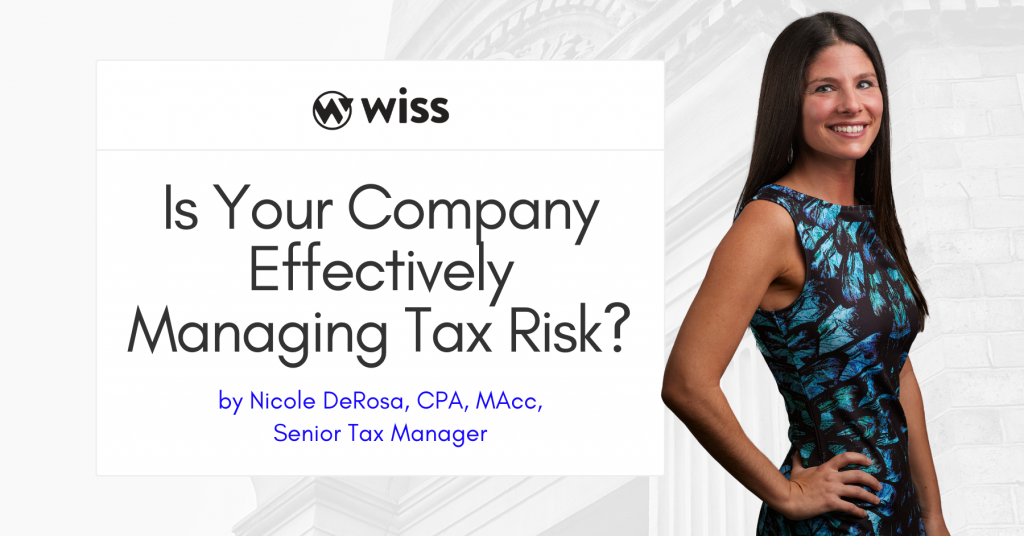By Nicole DeRosa, CPA, MAcc, Senior Tax Manager
IS YOUR COMPANY EFFECTIVELY MANAGING TAX RISK?
The concept of “tax risk” is an increasingly important and regular topic of discussion across organizations, and for good reason. Businesses that operate across state lines or internationally can in certain cases trigger tax liabilities in jurisdictions where they do not have a physical presence. In addition, many countries are adopting policies which require greater transparency in tax and financial reporting, providing tax administrations more information with which to raise investigations and issue assessments. As companies place additional focus on social responsibility and fiscal transparency, the benefits of having a tax risk policy in place can be quite substantial. Given the rapidly changing global tax environment combined with the continued demand for tax departments to add value to the organization, an effective tax risk policy is a necessity for any business needing to better manage their tax risk.
According to the 2022 BDO Tax Outlook Survey, 51% of tax executives surveyed said they have a tax risk policy “complete and ready,” and 46% said their tax risk policy is a “work in progress.” Additionally, 94% of respondents reported that tax risk is “highly” or “moderately” included as part of their board of director’s oversight function. Whether they have fully implemented policies or are still in the drafting stage, all businesses should take the appropriate steps to be certain their tax risk policy contains what it needs to effectively manage tax risk
Insight
Believe it or not, every business decision has a tax implication and with each decision comes the potential for tax risk. An important part of managing tax risk rests with the ability of the tax department to proactively analyze and plan for the tax effects of business transactions as well as correctly report the associated tax consequences. Effective processes and controls that include regular, transparent communication with non-tax leaders and decision makers are essential.
A comprehensive tax risk policy will help tax departments mitigate financial reporting risk and potentially adverse operational consequences. In addition, a tax risk policy can provide shareholders and other stakeholders, tax authorities and regulators greater assurance that an organization has a thoughtful and robust approach to tax strategy and tax risk.
What is tax risk?
Tax risk is a company’s risk of incurring additional tax, interest, or penalty costs due to incorrectly underreporting its tax obligations in its financial statements or in tax and other regulatory filings. It also includes the risk a company will unnecessarily pay more taxes than it might otherwise legally owe due to missed planning opportunities and/or lack of a clear tax strategy. Some examples of potential areas of tax risk include:
- Failing to properly consider the tax impacts of a transaction due to a lack of communication between tax and the business organization.
- Incorrectly underreporting taxes due to computational errors or misapplication of tax rules and regulations. Underreporting errors can expose a company not only to additional tax cost but also underpayment interest and civil or even perhaps criminal penalties.
- Unnecessarily over reporting taxes due to insufficient or erroneous tax analysis or lack of tax planning. Over reporting errors can result in needless cash flow drains, as well as potential examinations and delayed refunds.
- Failing to identify changes in tax law or other new developments affecting the company’s tax positions due to a lack of tax department resources.
The benefits of a tax risk policy
As part of an overall tax policy, every business should have a documented policy that addresses tax risk.
A comprehensive and properly implemented tax risk policy helps ensure a company’s tax behavior is in alignment with the company’s overall risk profile. An effective tax risk policy also strengthens tax risk awareness across the wider organization through better communication, processes and controls that include executive oversight of tax strategy. A well-developed tax risk policy should include:
- A clearly articulated tax strategy, approved by management and the board of directors, that is aligned with the risk appetite of the broader organization.
- Robust internal control policies, processes and review and oversight procedures around tax reporting and planning that can be shared with tax authorities and stakeholders.
- Sufficient tax department resources, technology, and training along with clearly defined roles and responsibilities for tax department personnel.
- A documented policy setting out the company’s approach to interaction with tax authorities and regulators.
- A regular cadence of communication with organization leaders and board members regarding tax strategy, as well as procedures to help ensure that tax risk is considered when engaging in business planning.
Is your company’s tax risk policy effectively managing tax risk?
Every business should have a tax risk policy in place that not only articulates their tax strategy and vision but also reflects the way the company operates. To be effective, a tax risk policy must be consistent with the policies of the broader business organization. In an ever-changing business and tax environment, an effective tax risk policy will include procedures that require the policy to be regularly assessed and modified as needed. Indications that your tax risk policy should be reviewed include, but are not limited to:
- Increased tax examination activities or unexpected tax examination findings.
- Recent control deficiencies related to the tax function.
- Legislative changes.
- Tax department turnover or a department reorganization that could lead to loss of institutional tax knowledge.
- Upcoming M&A or other significant business transactions.
- Changes to business operating models or supply chains, organizational transformation, or similar business factors.
- Increased board or stakeholder inquiries related to tax.
